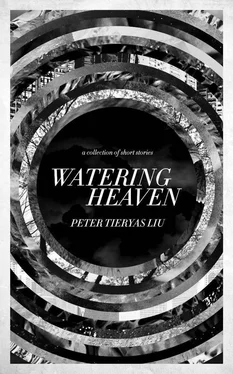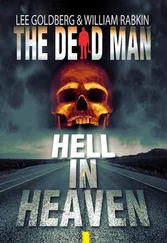I shrug. “My grandpa used to say, ‘If you live for the future, you’re a corpse to the present.’”
“That’s the first time I’ve heard you mention anyone from your family,” she says.
I lift up one of the images. “This guy looks exactly like him.”
My grandpa peddled quaint stories about humans the size of ticks and empires crushed by legions of angry fish. He was an asshole to his kids, treated his workers like slaves. He passed away alone in some alley in Chinatown. His favorite story was about a king who died and reincarnated as a pigeon. The king had been cruel, imposing heavy taxes and starving his people so he could fund three private palaces. He was found by a ravenous hunter, boiled and eaten for dinner.
The closest I ever got to Sharon was on a drunken night about five months ago when I took her home and she talked about photons from the sun obliterating electricity.
“My mom left my daddy when I was eleven, took me with her,” she said. “When I was older, I asked her why she left.”
“And?” I asked.
“She couldn’t stand the fact that he always smelled like shit.”
The guide finally takes us to see Li Tong. He’s in a dark auditorium lit by a thousand candles. He looks like a human porcupine with thousands of needles lodged inside him.
I snap a couple quick shots. Li Tong chants in a language I don’t recognize. His body begins to levitate. A few inches, slowly ascending. I check the ceiling for strings. Don’t see any.
“He spent twenty-seven years meditating before he floated an inch,” the guide suddenly says in perfect English. “And now, behold!”
Li Tong flies up in a twirl. Swoops past us, more agile than a dove. Air is his swimming pool and he dances like a ballerina.
Sharon grips my wrist. “Are you getting this?”
“Yeah.”
A miracle squared.
“How is this possible?” Sharon whispers to me.
“Three years,” Li Tong speaks, “I didn’t think of right or wrong, benefit and harm. I cleared polarities from my head. Five years, I focused on good and evil, advantage versus disadvantage. Eight years later, my action had transcended consequence, and by my twenty-seventh year, my thoughts melded with nature and all my flesh and bones had evaporated.”
His expression is carefree. Even when he’s doing difficult aerial moves, his face is neutral.
The interview lasts about an hour. He describes his life like torn pages in a library, masquerading as a hunger artist, philandering with women of ill repute, gambling with psychics and losing to them at mahjong. “Walking on water is easy if you know where to step,” he says.
His wife was an Indian snake charmer and they loved each other dearly. “But we were like those two ill-fated lover gods who shouted at each other until they became so cold and obdurate, they turned into mountains.”
His epiphany was a hummingbird and a bat to his head (his wife was sent to prison for battery). He lost all sense of 3-D perception and the world became a flat plane.
“Everything had gradients. Everything was linear from the right angle.”
Sharon is giddy, more excited than I’ve ever seen her. As our session ends, she asks if we can have one last demonstration.
“Give me a short respite,” Li Tong asks.
Li Tong and the guide scuffle vociferously. I’m not sure what it’s about but it’s intense. The guide storms off.
We review the video and it’s hard to believe. It’s like cheap computer graphics. But there’s nothing artificial about it.
“This is going to change our lives,” she says.
I nod. “It’s pretty incredible.”
“This whole place,” she says, sweeping her hand. “It’s like a subculture frozen in the Arctic. There’ll be a thousand stories here. If the world hears about it…”
If they hear about it, they’ll marvel at it for a second and forget it the next. But I don’t want to dash her hopes, just agreeing with everything she says.
Li Tong prepares for another flight. The guide is nowhere in sight. Several of the inhabitants of the park are watching. He starts slowly, ascending in nodules. Blasts off, screeching through the air. He’s like a zygote or an imago streaming through a placenta. Sharon unconsciously grips my hand, her chest crunched up in expectation. Her eyes follow every motion, and the only thing keeping me from watching him is her.
“Why aren’t you recording?” she demands.
I get out my camera, zoom in. Li Tong’s face is taut and there’s sweat covering his face. He looks exhausted. I lower my camera. Li Tong crashes into a pole, flips, then crashes to the ground. Sharon shrieks. We run over to him. All the needles in his body have impaled him. A thousand rivulets of blood have veered out like roots.
“Li Tong,” Sharon calls. “Are you okay? Li Tong!”
But I can already tell he’s not breathing.
The gruff guide comes in, screaming at the top of her lungs. She’s hysterical and though I can’t understand her, it’s obvious her rage is directed at Sharon.
“We should get out of here,” I whisper.
“Why?”
“Let’s get out of here,” I repeat.
“But…”
A group of the park people surround us. I grab Sharon’s hand and bolt. We run past tents, past the buildings. A throng of them is in front of us. I take a quick left. There’s several alleys and they’re all filled with angry denizens who swarm us.
Ropes are tied around our hands and legs. We’re carried like mincemeat for swine. The guide is barking orders. I can hear some of the men saying, “She killed Li Tong,” and, “They tried to scam us.”
I don’t see where we’re going, but I smell it.
The river of shit.
Putrid, malodorous, acrid : pale adjectives for what hits us. I’m about to puke.
“Sharon!”
“What?”
“Hold your breath!”
A hurtle, flashes of mobs, and then I’m surrounded by crap and oil and chemicals I can’t imagine. I’ve physically blocked my nostrils and the smell is still hammering my skull. There’s raucous laughter and serious admonishments, “Don’t ever come back!!!”
It’s five minutes of hell and putrescence. The communal canal of piss and diapers is a viscous morass that stymies movement, globules of excrement bunching together like diarrhea quasars. I do my best to ignore the fact that my flesh feels like it’s melting, that my legs could drop off any second, wading as fast as I can.
When we emerge on the other side, Sharon looks surprisingly placid.
“You okay?” I ask.
“You lose your camera?” she asks back.
I nod.
“When my dad was studying feces, his shoes were ruined since he walked in crap the whole time. One of the prisoners gave him his own shoes. My father was so grateful, he dedicated the book to him. But my dad never found out what happened to the guy.”
“Are those the shoes you’re looking for?”
“When I was a little girl, I hated those shoes because they smelled so bad. So when he was sleeping, I threw them away. He cried for a whole week after that.”
She stares at the park with melancholy eyes.
“We have a long walk ahead of us,” I say.
“He blamed it on a robber, but after he died, I found his journal. The whole time, he knew it was me, but he never got mad at me. Never said a word.”
I put my arm around her. Our sheathes of shit mix. She grips my hand tightly. We walk in silence the whole way back.
The Political Misconception of Getting Fired
I.
My mom always talked about how her great-grandfather fought in the Opium Wars against the British Empire. Zhou Liao charged a battalion of musketeers with a sword when everyone else fled. Even though he was shot to pieces, he laughed all the way to his grave. Posthumously, he was commemorated as a hero who died with honor: if more soldiers had been like him, no way would the Chinese have lost the war.
Читать дальше












